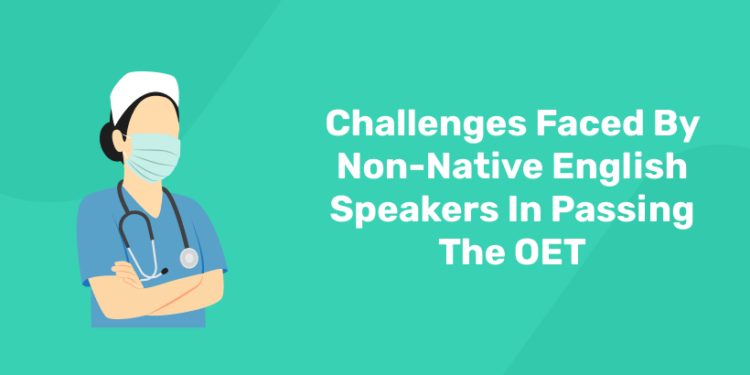Table of Contents
OET is a proficiency test which evaluates your English language skills in Reading, Writing, Listening and Speaking. unlike IELTS, OET is specifically designed for healthcare professionals. It is designed to assess the communication skills of 12 medical professionals such as nurses, dentists, optometrists, doctors, etc. While the first two parts of the test, listening and reading, are similar across occupations, the writing and OET Speaking Test may vary depending on your specific medical occupation.
If you are a healthcare professional, like a nurse, dentist, pharmacist, or physiotherapist, and looking for an opportunity in countries like the UK, New Zealand, Singapore, UAE, or Australia, you will first have to clear OET (Occupational English Test).
One of the biggest challenges for non-native speakers is paying attention to the Reading and Speaking subtests. For this reason, many medical professionals begin by learning a British or American accent. However, this is not usually necessary if you speak clearly regardless of your natural accent. Challenges related to language skills are easier to overcome than cultural ones. Cultural differences need to be respected, while English skills can always be improved. Speaking is more difficult than listening because the participant’s vocabulary may be a bit limited. Non-native English speaking adults face numerous challenges due to their limited proficiency in the language. From difficulties in communication to exclusion from social and community activities, these individuals may face significant obstacles in their daily lives.
In this article we are discussing about the challenges faced by non native English speakers in passing the OET.
| OET COACHING OFFERED | ||
| OET Coaching Classes | OET Coaching in Calicut | OET Coaching in Kochi |
| OET Coaching in Kottayam | OET Coaching in Thrissur | OET Coaching in Trivandrum |
Challenges Faced By Non Native English Speakers
- Difficulty in communication: The inability to speak English fluently often leads to communication difficulties in daily life. This can make simple tasks, such as ordering food at a restaurant or asking for directions, incredibly challenging.
- Limited job opportunities: English proficiency is increasingly seen as a desirable skill for many jobs. Non-native English speakers may miss out on employment opportunities due to their language limitations, hindering their career advancement.
- Social isolation: Struggling with English can also lead to social isolation, as individuals may have difficulty making friends and connecting with others in their community.
- Difficulty accessing information and resources: Information and resources, such as government services, medical care, and educational materials, are often presented in English. This can create barriers for non-native speakers and limit their ability to fully participate in their community.
- Struggles in education and training: English is also commonly used as the language of instruction in many schools and training programs. Individuals who struggle with the language may find it difficult to keep up with their coursework, leading to frustration and a sense of inadequacy.
- Challenges navigating healthcare and legal systems: Navigating healthcare and legal systems can also be a major challenge for non-native English speakers. They may have difficulty understanding instructions, filling out forms, or communicating with doctors and lawyers.
- Financial difficulties: Language barriers can also make it difficult for non-native English speakers to access financial resources and services, leading to financial difficulties.
- Inability to fully participate in community activities: English is often used as the language of communication at community events, meetings, and gatherings. Non-native English speakers may feel excluded and unable to fully participate in these activities.
- Cultural barriers and feelings of discrimination: The inability to speak English can also lead to cultural barriers and feelings of discrimination. Individuals may feel isolated and marginalized due to their language limitations, leading to feelings of insecurity and low self-esteem.
- Difficulty expressing thoughts and emotions accurately: Non-native English speakers may also struggle to express their thoughts and emotions accurately, leading to misunderstandings and frustration.
Any English test of international standard will have its own challenges. OET is no exception. But, here, in OET, the challenges are too big.
Being a professional, you may think it is easy at one glance as you will find the content of the test to be relevant to your profession. But, in reality, it will be difficult to pass this test. So, what are the challenges in the OET reading sub-test? Let us discuss a few of them.
Unlock Our Specialized OET Course! Book For Free Demo Class!
Part A of the Reading Sub-Test
This part of reading sub-test is enough to make anyone confused. There will be 15 minutes to complete this part but it will require expeditious reading skills. How good are you at locating the specific information? Can you read different texts and come to one common and acceptable solution?
You will be given four short texts. These four texts will discuss about one particular subject. And there will be 20 questions to answer.
All different texts may point out to one particular subject but, superficially all these texts may look different to the test takers. The test taker may get tricked into considering these four texts as four different topics. So, be careful and read twice if you find it difficult to see direct relevance among these texts.
Different types of questions & the limited time for it makes this task difficult. Most of the candidates spend more than the required time on it and because of this, they do not manage to complete the whole test on time. So, it is recommended that you should try to complete this first part of the test within or less than 15 minutes.
Part B and Part C of the Reading Sub-Test
There will be 45 minutes to complete these two parts of the test. But, you will have to practice hard to answer part B completely well within 12-15 minutes of time. Generally, part C of the test is more challenging and may take more time.
You will have very little time to complete the test. 45 minutes may really be not enough if you are not good at smart reading and comprehension. The questions may seem more complex to you. Almost all of the candidates, even the smartest of the candidates, feel some level of difficulty in answering all the questions. Most of the candidates complain of not being able to manage the time because of the difficulty in comprehending and finding the answers to the questions.
crack oet exams with ease ! join now !
Common Reasons Why People Fail The OET Test
By knowing the common reasons why most people fail the exam will definitely help you improve your preparation. The most common reasons are the following:
- Poor Preparation
- Consumes a lot of information
- Relying on inappropriate sources
- Don’t learn from your mistakes
- Pronunciation problem
Conclusion
Healthcare professionals have many reasons to learn English. In the healthcare industry, people lives are at stake, so any misunderstanding is risky. It is therefore crucial to pay attention to language in fostering a trustful and comprehensible relationship between healthcare staff and both patients and family members. The choice of words used is highly important to avoid confusion and to calm and ease the mind of the family members.
Having considered all the above points, we can conclude that the English is one of the important languages of the healthcare industry. This is the language that connects the professionals, makes it possible to transfer the experience, skills and knowledge and very important to provide quality care to patients.










